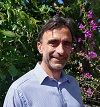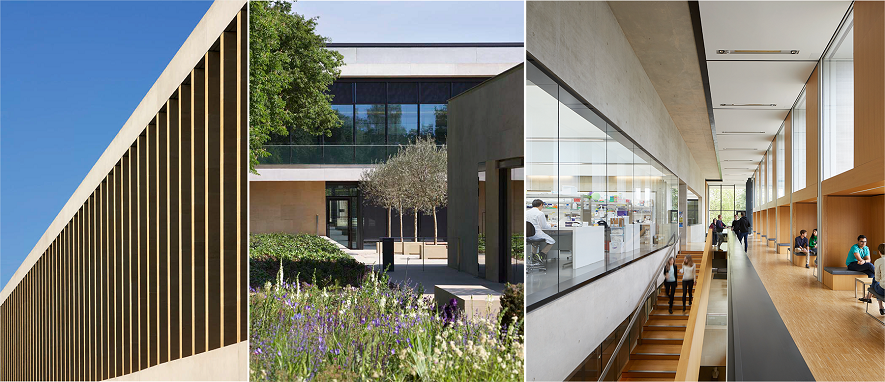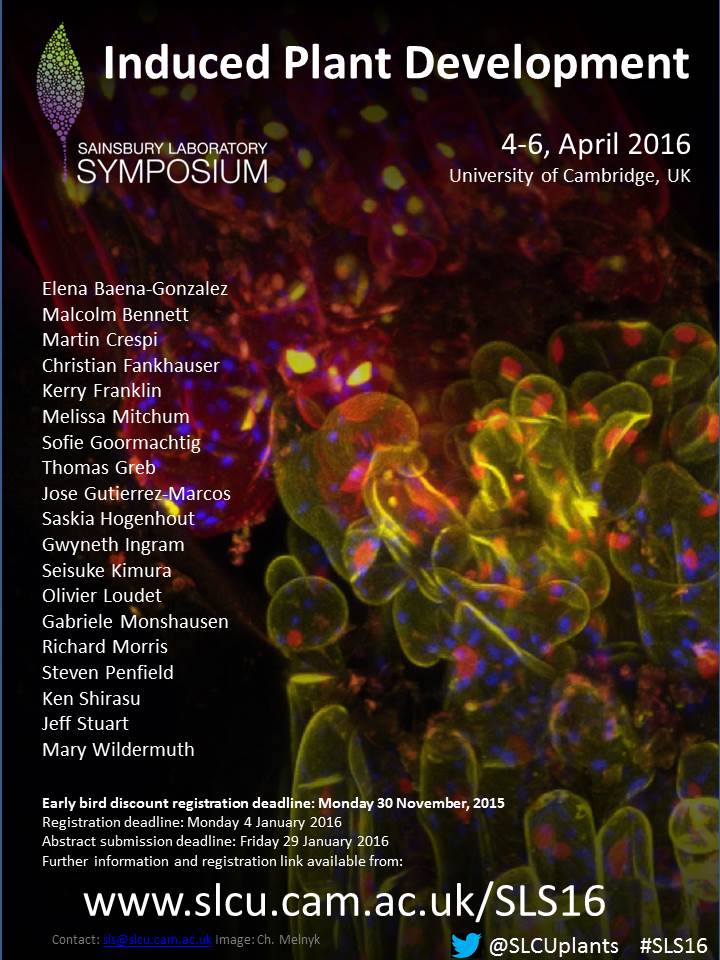
Sainsbury Laboratory Symposium 2024
Development — Reprogrammed
17-19 September 2024 | Cambridge UK in-person and online live stream
LIVESTREAM THE SYMPOSIUM TALKS
We will be livestreaming the talks over Zoom. The talks will not be recorded. You can register for the livestream up until 16 September. The livestream registration fee is £75.
ABSTRACT SUBMISSIONS TO PRESENT A TALK OR POSTER HAVE NOW CLOSED
Symposium overview
The theme for the 2024 Sainsbury Laboratory Symposium is “Development - Reprogrammed”. Throughout plant evolution, and notably during crop domestication, the processes and mechanisms underpinning plant development have undergone changes. Additionally, plants are remarkable in their ability to adapt their development to environmental cues such as temperature, light, drought, and plant-inhabiting microbes. This Symposium aims to unite researchers from various disciplines who work with a wide range of species from around the world, all with an interest in understanding developmental variation be it genetically-encoded plasticity or genetically-selected by nature, breeding or rational design.
The Symposium's four topic areas are:
- Reprogramming by Evolution
- Reprogramming by Domestication
- Reprogramming by Environment
- Reprogramming by Engineering
Symposium coordinators
Abstract Review Committee
Zoe Nahas, Alan Wanke, Henry Temple, Tamsin Spelman, Jawahar Singh, Lucie Riglet, Renuka Kolli, Elena Salvi, Elliot Cordier, Aram Gurzadyan, Pjotr van der Jagt and Haitem Elmassoudi.
Contacts
For all enquiries, please contact the Sainsbury Laboratory events team on sls@slcu.cam.ac.uk.
Reprogramming by Evolution
Over millions of years, plants have undergone intricate genetic changes that have shaped their growth patterns, morphology, and reproductive strategies. This reprogramming is evident in the diverse array of plant forms we see today, from towering trees to delicate flowers. In this session, we’d also like to hear how environmental pressures, such as climate shifts and interactions with other organisms, have played a pivotal role in driving these developmental adaptations.
Reprogramming by Domestication
The domestication of crops has led to a targeted and deliberate reprogramming of their development, driven by human selection pressures. Over millennia, as agriculture emerged, humans began cultivating and breeding plants to enhance desirable traits such as yield, nutritional content, and resistance to pests. This selective pressure has influenced the genetic makeup of domesticated plants, altering their growth habits, reproductive strategies, and overall morphology. This session’s focus is the process of artificial selection and how humans have essentially guided the course of plant development, shaping species to meet specific agricultural needs.
Reprogramming by Environment
The reprogramming of plant development in response to their abiotic and biotic environment reflects the interplay between genetic predisposition and external stimuli. Abiotic factors such as temperature, light, and soil composition, as well as biotic factors like interactions with other organisms, exert selective pressures that drive adaptive changes in plant physiology and morphology. This session will feature presentations showcasing the complex molecular mechanisms underpinning adjustment of plant developmental pathways to optimize survival and reproduction in specific environmental contexts. A dynamic responsiveness allows plants to exhibit a remarkable degree of phenotypic plasticity to navigate and adapt to the diverse challenges presented by their surroundings.

Reprogramming by Engineering
By precisely manipulating specific genes, biotechnological approaches enable scientists to tailor plant development for improved yield, resilience to environmental stress, and enhanced nutritional profiles. In this session we will showcase the cutting-edge approaches and how they harness the potential to revolutionise agriculture by customising the intrinsic developmental processes of plants, paving the way for more robust and adaptable crop varieties. We also discuss the responsible implementation and thorough consideration of ethical implications to ensure that bioengineering practices prioritise sustainable and beneficial advancements in plant development.
Keynote Speakers

Professor Keiko Sugimoto
RIKEN Center for Sustainable Resource Science
Cell Function Research Team website
@K_Sugimoto_Lab

Professor Zachary Lippman
Cold Spring Harbor Laboratory
Lippmann Lab website
Invited Speakers

Benjamin Blackman, UC Berkeley
Blackman Lab website

Devin O'Connor, Pairwise
Pairwise website

Caixia Gao, Chinese Academy of Sciences
Gao Lab website

Eric Giraud, Institut de Recherche pour le Développement (IRD)
Plant Health Institute Montpellier

Jorge Dubcovsky, University of California Davis
Dubcovsky Lab

Jorge José Casal, Instituto de Investigaciones Fisiológicas y Ecológicas Vinculadas a la Agricultura (IFEVA)

Laura Moody, University of Oxford
Moody Lab website
BlueSky | X | LinkedIn

Laura Ragni, Universität Freiburg
Website profile

Ross Sozzani, North Carolina State University
Website profile

Yuki Hirakawa, Hiroshima University
Hirakawa Research Group
Short Talk Speakers
Adil Khan, The University of Western Australia
CRISPRi-based circuits for controlling gene expression in plants
Alessandra Devoto, Royal Holloway University of London
Analysis of chromatin landscape during drought and jasmonates treatment to increase plant fitness potential
Elena Salvi, University of Cambridge
Moving on from the foliar theory: Investigating the role of auxin and leaf-patterning genes during the development of the Hibiscus trionum petal pattern
Giovanni Sena, Imperial College London
Bioelectric patterns in plant tissue regeneration
Hatsune Morinaka, RIKEN
Investigation of the cell fate reprogramming of differentiated cells: single-cell transcriptomics during shoot regeneration
Sabine Brumm, University of Cambridge
Exploiting conserved actin regulators to achieve pathogen resistance in barley through root remodelling
Ward Poelmans, Ghent University
Parallel Paths: The Independent Adaptation of Ancestral Molecular Programs in Convergent Plant Root Evolution
Thomas H Dean, University of Warwick
Identifying and understanding a novel genetic pathway controlling Axillary Meristem Induction in wheat
Anne Vatén, University of Helsinki
Regulation of stomata production in seed plants
Flash Talk and Poster Presenters
Cloe de Luxán-Hernández, University of Copenhagen
From Defense to Healing: Mapping the Core Trio of Plant Resilience
Facundo Romani, University of Cambridge
The minimal cell-cycle regulation framework of Marchantia provides insights on the evolution of plants
Maxwell R. Fishman, RIKEN
RGF peptides and their cognate receptors play a role in Phtheirospermum japonicum haustorium development
Róisín Fattorini, University of Oxford
The molecular mechanisms underlying leaf vein development in maize (Zea mays) and rice (Oryza sativa)
Meenu Kapoor, Guru Gobind Singh Indraprastha University
Molecular Insights into Stress Adaptations in the Moss Physcomitrium patens
Jeppe Ansbøl, University of Copenhagen
Autophagy-assisted cellular reprogramming enables pluripotency acquisition and maintenance in Arabidopsis
Ju Young Bang, Seoul National University
Molecular Basis of Plastic Flower Development in Seasonal Cleistogamy of Viola
Kumud Saini, University of Cambridge
Warming up to rush to exit: Leaf development reprogrammed
Sarah Guiziou, Earlham Institute
Integrase circuits to elucidate and engineer plant development
Yordan Dolaptchiev, The Sainsbury Laboratory (TSL)
Efficient targeted Gene Insertions in Diploid Potatoes
Prakash Kumar Bhagat, Durham University
Efficient targeted Gene Insertions in Diploid Potatoes
Poster Presenters
Programme
Day 1: Tuesday 17 September 2024
13:30-13:50 Arrivals and Coffee
Session 1
Session Chair - Alexander Jones
13:50-14:00 Opening Remarks
14:00-15:00 Keynote: Zachary Lippman (Cold Spring Harbor Laboratory) Revealing and dissecting hidden genetic complexities of plant stem cell control
15:05-15:35 Invited Speaker: Ross Sozzani (North Carolina State University) Decoding Stem Cell Regulation in Plants: Insights from 3D Bioprinting and Predictive Modeling
15:40-15:55 Short Talk: Anne Vatén (University of Helsinki) Regulation of stomata production in seed plants
16:00-16:30 Tea Break
Session 2
Session Chair - Aram Gurzadyan
16:30-17:00 Invited Speaker: Jorge Dubcovsky (University of California Davis) Wheat spike development: insights from genetics and spatial transcriptomics studies
17:05-17:20 Short Talk: Thomas Dean (University of Warwick) Identifying and understanding a novel genetic pathway controlling Axillary Meristem Induction in wheat
17:25-17:55 Flash Talks
18:00-19:45 Poster session 1 and Dinner
Day 2: Wednesday 18 September 2024
09:00-09:30 Coffee
Session 3
Session Chair - Henry Temple
09:30-10:00 Invited Speaker: Laura Moody (University of Oxford) Genetic regulation of the 2-dimensional to 3-dimensional growth transition in the moss Physcomitrium patens
10:05-10:35 Invited Speaker: Yuki Hirakawa (Hiroshima University) Genetic mechanisms controlling stem cell identity in the meristem of Marchantia polymorpha
10:40-11:10 Invited Speaker: Ben Blackman (UC Berkeley) Sunflower growth, reproduction, and the predictable environment
11:10-11:15 Group Photo
11:15-11:45 Coffee
Session 4
Session Chair - Kumud Saini
11:45-12:00 Short Talk: Ward Poelmans (Ghent University) Parallel Paths: The Independent Adaptation of Ancestral Molecular Programs in Convergent Plant Root Evolution
12:05-12:20 Short Talk: Elena Salvi (University of Cambridge) Moving on from the foliar theory: Investigating the role of auxin and leaf-patterning genes during the development of the Hibiscus trionum petal pattern
12:25-12:55 Flash Talks
12:55-15:00 Poster Session 2 and Lunch
Session 5
Session Chair - Max Josse
15:00-15:30 Invited Speaker: Jorge Casal (Instituto de Investigaciones Fisiológicas y Ecológicas Vinculadas a la Agricultura (IFEVA)) Integration of environmental cues to reprogram growth patterns
15:35-16:05 Invited Speaker: Laura Ragni (Universität Freiburg) From Stem Cells to Shield: Unravelling the Mechanisms of Periderm Development
16:10-16:25 Short Talk: Alessandra Devoto (Royal Holloway University of London) Analysis of chromatin landscape during drought and jasmonates treatment to increase plant fitness potential
16:25-16:45 Tea Break
Session 6
Session Chair - Renuka Kolli
16:45-17:15 Invited speaker: Eric Giraud (Institut de Recherche pour le Développement (IRD)) ET-Nod: A new class of diverse Type III effectors in Bradyrhizobium strains triggering nodule organogenesis in legumes independently of Nod factor
17:20-17:35 Short Talk: Sabine Brumm (University of Cambridge) Exploiting conserved actin regulators to achieve pathogen resistance in barley through root remodelling
17:40-17:55 Short Talk: Giovanni Sena (Imperial College London) Bioelectric patterns in plant tissue regeneration
19:00 Gala Dinner Downing College
Day 3: Thursday 19 September 2023
08:30-09:30 Early Career Researchers Breakfast
09:00-09:30 Coffee
Session 7
Session Chair - Madelaine Bartlett
09:30-10:00 Invited Speaker: Caixia Gao (Chinese Academy of Sciences) Precision Genome Editing Technologies: Revolutionizing Crop Breeding for Future Agriculture
10:05-10:35 Invited Speaker: Devin O’Connor (Pairwise) Engineering genetically dominant maize yield-component improvement with gene editing
10:40-10:55 Short Talk: Adil Khan (The University of Western Australia) CRISPRi-based circuits for controlling gene expression in plants
11:00-11:15 Short Talk: Hatsune Morinaka (RIKEN) Investigation of the cell fate reprogramming of differentiated cells: single-cell transcriptomics during shoot regeneration
11:15-11:45 Tea Break
Session 8
Session Chair - Sebastian Schornack
11:45-12:45 Keynote Speaker: Keiko Sugimoto (RIKEN Center for Sustainable Resource Science) How do plants reprogramme cell fate in regeneration?
12:45-13:00 Closing Remarks
13:00 Tours of Sainsbury Laboratory, picnic lunches and access to Cambridge University Botanic Garden
Key Dates
- 29 March: Registrations open
- 29 April: Abstract submission deadline
- 13 May: Talk and poster acceptance notifications sent out
- 04 August: In-person and online standard attendance registration payment deadline
- 26 August: In-person late attendance registration payment deadline
- 16 September: Online late attendance registration and payment deadline
Registration Fees
- PI: £400 (£475 after 4 August 2024)
- Students and Postdocs: £300 (£375 after 4 August 2024)
- Industry :£475 (£550 after 4 August 2024)
- Online delegate: £50 (£75 after 4 August 2024)
Online attendance includes access to the conference abstract book, talks, and the conference Teams site for chatting with other delegates only.
In person registration includes access to the full programme and all listed catering and social events.
Register to attend by completing this online registration form.
Registration changes and cancellations
For any cancellations, please contact sls@slcu.cam.ac.uk.
Abstract submissions are now closed
Abstract Submissions
We particularly welcome abstract submissions from early career researchers, women, people from ethnic groups underrepresented in science and/or resource-limited countries as they are currently under-represented in scientific research meetings. We will be promoting our Symposium to a diversity of research institutions and countries. If you know of any people, research groups or institutions you think would be interested in presenting a short talk and/or poster, please share this website with them or contact us at sls@slcu.cam.ac.uk.
Options for participating
You can submit an abstract as part of the registration process. Abstracts submitted by people who have not registered will not be considered.
You must submit a 250-word maximum abstract if you wish to be considered for presenting a short talk, flash talk or poster.
-
Short Talk: 15-minute talk
-
Flash Talk & Poster: 3-minute talk and poster presentation
-
Poster Only: poster presentation
Important points for submitting an abstract:
- Make sure you download the abstract template (.docx, 13.8KB)
- Follow the formatting and 250 word limit.
- Name your abstract file as your full name as used when publishing scientific papers.
- Your topic should broadly align to the symposium theme Development Reprogrammed.
- Abstracts may not be edited/updated after they are submitted.
- Your abstract should be submitted in English.
- Please only submit one abstract.
- The submitting author will receive all correspondence about the abstract so we advise that the presenting author is the person who submits the abstract.
- Submission of an abstract acknowledges your acceptance for the abstract to be published in the official symposium publications.
- The presenting author must ensure that all co-authors have approved the abstract content and to its submission to be presented.
Confirmation of abstract submission
Your abstract is not successfully submitted until you receive a confirmation email after clicking the final submit button as part of the registration process. If you do not receive a confirmation email, please contact us at sls@slcu.cam.ac.uk.
Notification that your abstract has been accepted
Each abstract will be reviewed by the Symposium Coordinators. Notification of acceptance or rejection of submitted abstracts will be sent to applicants via email by Monday 13th May 2024. Full instructions concerning talk and poster presentations will be sent to presenters.
Information coming soon.
Instructions for Poster Presenters
If you are selected to present a poster, please bear the following in mind:
Please ensure you have the consent of all contributors to your poster to share the information on it and that you have appropriate copyright permissions in place.
Please indicate any preference for a specific poster session time (lunchtime or evening).
Your poster should be portrait orientation and B1 size (707 x 1000mm / 27.83 x 39.37 inches). We will provide poster boards and velcro dots for your use.
Here are some suggestions for creating accessible, engaging posters:
https://guides.library.yale.edu/academic-poster-resources/accessibility
The Venue
Sainsbury Laboratory
University of Cambridge
47 Bateman St, Cambridge CB2 1LR
The Sainsbury Laboratory building
- Step-free access to building and to all venue spaces (fully wheelchair accessible)
- Accessible gender-neutral self-contained toilets
- Prayer/Reflection Room
- Family Room
- Lactation Room
Auditorium
- Step-free access
- Audio induction loop
Transport
-
Train: The Camnbridge Rail Station is 0.5 miles from the Sainsbury Laboratory along a relatively level sealed pathway.
-
Parking: There is no car parking available at SLCU other than two spaces reserved for those who require disabled access. If you need to park in the area, full-day pay and display parking is available at the Cambridge Rail Station (0.7 miles) and Trumpington Road (0.3 miles), which are both reached via a relatively level sealed pathway.
-
Bicycle facilities: Bicycle parking is available in stands on-site.
Internet access
Free wifi access is available onsite and throughout most of Cambridge city via Eduroam or as a UniOfCam-Guest. You can connect to UniOfCam-Guest by registering by email or through your Amazon, Facebook, Github or LinkedIn account.
On-site facilities for children and carers
We have a number of onsite facilities and resources to support attendees and their families. While we are not able to provide on-site childcare, we have a dedicated family room and private lactation room with refrigerator for milk storage - both accessible at any time and located very close to the auditorium. We also provide a number of baby/toddler furniture items, such as highchairs, toilet seat and changing table.
Please contact events@slcu.cam.ac.uk if you have any questions or suggestions for ways that we can support you during the event.
Junior Delegates
Children will be issued with a Junior Delegate pack including a name badge (first name only, with emergency contact details on the back) and some activities that they might enjoy. Children must be accompanied by a parent or carer at all times.
Family Room (Darwin Room)
A multi-use room will be a dedicated space for families to use during the day. This room has soft lounges, table and chairs, soft floor coverings and is a suitable space for carers to use when supervising young children or for childminders/partners/carers to use while the event is in progress.
There are also baby changing facilities, toddler toilet seat and highchairs available on site.
Lactation
Breastfeeding is welcome in all public areas of the building. We also provide a private room for nursing and pumping with a separate fridge for milk storage.
Access to the Botanic Garden
The Lab is surrounded by the Cambridge University Botanic Garden, a traffic free area with a café. Please contact the conference organisers so we can arrange for free access to the Garden for your partner/childminder during the conference.
Suggested activities for children
We are gathering ideas and suggestions from local families and will list nearby parks, activities and child friendly cafes and restaurants on this page closer to the date of the conference.
Local Attractions
Please find below links to a number of family-friendly attractions within walking distance of the symposium or accessible by public transport.
University of Cambridge Museums and Botanic Garden
- Cambridge University Botanic Garden
- Museum of Archaeology and Anthropology
- The Fitzwilliam Museum
- Museum of Zoology
- Sedgwick Museum of Earth Sciences
- Museum of Classical Archaeology
- Kettle's Yard
- The Polar Museum
- Whipple Museum of the History of Science
Cherry Hinton Hall Park (duck ponds)
Nene Valley Railway (home to Thomas)
Sheep's Green (play park)
Accommodation in Cambridge
In Cambridge there are multiple options for accommodation including hotels, bed and breakfasts, guesthouses, college rooms, and serviced apartments. The symposium will be held during the University of Cambridge summer break and so colleges may have single student rooms available. To find suitable accommodation, we recommend checking the following hotels and websites:
Getting to Cambridge
Train
The city of Cambridge is easily accessible by train, with the primary station located about a mile from the city centre, which takes approximately 20 minutes on foot. The Sainsbury Laboratory is located only 1 km, or 0.6 of a mile, from Cambridge Station.
For train schedules and ticket reservations, visit National Rail Enquiries or Trainline.
Driving
There is no car parking available at SLCU other than two spaces reserved for those who require disabled access. If you are planning to drive to Cambridge, we recommend you either book accommodation that includes parking or use the Park & Ride scheme. If you need to park in the area, full-day pay and display parking is available at the Cambridge Rail Station and Trumpington Road (0.3 miles). For more information, please visit www.cambridge.gov.uk/parking.
Bus
Local bus services usually run to/from Cambridge bus station in Drummer Street, and/or the adjacent Emmanuel Street and St Andrew’s Street. There are frequent buses from the railway station to the city centre.
The 'U' Universal bus service bus service runs from Eddington, next to the Madingley Road Park and Ride site, through to our Biomedical Campus from Monday to Saturday, and from Eddington to Cambridge Railway Station on Sundays.
Please help share the word about the Sainsbury Laboratory Symposium by distributing the A4 poster.
A4 Poster (PDF)
PowerPoint slide (downloads pptx file )
Creating an inclusive and respectful meeting
Professional and respectful etiquette
We are looking forward to many productive and invigorating discussions at the Sainsbury Laboratory Symposium. In order to create a space that fosters open dialogue and where everyone feels welcomed, respected and safe we expect that all Symposium participants will treat others with consideration and professionalism. Discrimination, intimidation, hostile conduct and all other forms of harassment will not be tolerated.
To help create a meeting that welcomes free expression of ideas, please:
- Listen to the contributions of everyone with respect and appreciation.
- Be open to other participants’ opinions. Critique ideas, not people.
- Give feedback constructively and with kindness.
- Share your thoughts and be mindful that time is limited and others may wish to speak.
Positive action
We are working to provide a Symposium where everyone can participate. We acknowledge that science in general and this conference in particular do not reflect the true diversity of the global plant science community. We are taking the following actions:
- Actively promoting the Symposium as a platform to present their work to scientists around the world and in particular targeting institutions and countries that are underrepresented in scientific research meetings.
- Establishing an abstract review committee of early career scientists (students and postdoctorates).
- Collecting optional demographic data of participants who register to present at and attend our Symposium. The purpose of these questions is to assist with diversifying speakers in sessions & engaging non-traditional speakers including the prioritisation of balanced demographics in speakers. This will also enable the Symposium organisers to determine if their outreach and dissemination efforts are effective.
- Presenters will have the option to have their presentations be made public after the symposium so that their content can reach a larger audience.
- Providing a multi-use family space for carers, lactation room, gender neutral toilets, and accessible spaces.
- Providing a neuro-inclusive evironment, for example providing hybrid attendance options for everyone at any stage of the symposium, providing a quiet room that provides a respite from the meeting while still offering the opportunity to listen in on sessions with headphones, offering priority access to refreshments and meals and asking in-person delegates to minimise the use of perfume and other scented products.
- Accessible auditorium, with flexible seating options (fixed seating, bench seats, free-standing chairs and designated wheelchair spaces) and provision of an audio induction loop system.
- Asking delegates at registration to identify ways that the Sympoisum can be made more readily accessible to them and making changes in response.
If you have any comments of questions regarding the Symposium EDI initiatives, please contact sls@cam.ac.uk.
2022
Sainsbury Laboratory Symposium (21 to 23 September 2022)
Theme: Regulatory Dynamics in Development and Evolution
Speakers
Keynote speakers
- Kerstin Kauffman (Humboldt-Universität zu Berlin) Regulatory mechanisms controlling cellular differentiation in flower development
- James Sharpe (EMBL) 3D tissue morphogenesis from plants to animals? Same difference.
Invited speakers
- Erik Clark (University of Cambridge) Arthropod segmentation dynamics during development and evolution
- Ting-Ying Wu (Temasek Life Science Laboratory) Expansion of gene regulatory network in plants upon environmental changes: what is kept and what is lost throughout the evolution
- Alexandre Marand (University of Georgia) An exploration of cis-regulatory diversity in plant single-cells
- Berta Verd (University of Oxford) On the role of cell rearrangements in pattern formation
- Renske MA Vroomans (University of Cambridge) Evolution of spatial patterning in vascular plants
- Suriya Murugesan (National University of Singapore) Gene-regulatory network governing the origin of butterfly eyespots- a novel complex traits
- Kaisa Kajala (Utrecht University) Evolution of dynamic barrier cell types
- Isaac Salazar Ciudad (Centre De Recerca Matematica) How to develop and evolve complex robust phenotypes?
- Marcus Heisler (University of Sydney) Patterning lateral organ development in Arabidopsis
- Aman Husbands (University of Pennsylvania) HD-ZIPIII transcription factors are controlled by deeply conserved START domains
- Annis Richardson (The University of Edinburgh) How do Grasses Grow?
2020
Sainsbury Symposium (19 to 21 September 2018)
Theme: The Coordination of Development
Speakers
Keynotes
Confirmed speakers
- Elena Baena-Gonzalez
- Malcolm Bennett
- Martin Crespi
- Kerry Franklin
- Melissa Goellner-Mitchum
- Thomas Greb
- Jose Gutierrez-Marcos
- Saskia Hogenhout
- Gwyneth Ingram
- Seisuke Kimura
- Olivier Loudet
- Gabriele Monshausen
- Richard Morris
- Steven Penfield
- Ken Shirasu
- Jeffrey Stuart
- Mary Wildermuth
2018
Sainsbury Laboratory Symposium (19 to 21 September 2018)
Theme: The Coordination of Development
Invited speakers
Patrick Achard (Institut de Biologie Moléculaire des Plantes (IBMP)) Long-distance transport of gibberellins in plants
Tim Brodribb (University of Tasmania) Talk title: Coordination between the vascular supply and stomatal demand for water in leaves
Simon Gilroy (University of Wisconsin-Madison) Coordinating long-range stress signaling in Arabidopsis
Stefan Kepinski (University of Leeds) Gravity and the shaping of plant form: growth angle control in root and shoot branches
Mark Lagrimini (University of California) Is trehalose-6-phosphate a key regulator of carbon utilization and partitioning?
Yoshikatsu Matsubayashi (Nagoya University) Long-distance peptide signalling mediating systemic regulation of nitrogen acquisition
Richard Morris (John Innes Centre) Green Telecommunication
Jarmila Pittermann (UC Santa Cruz) Adaptive radiations and novel traits: co-ordination of xylem structure and function through deep time.
Salomé Prat (Centro Nacional de Biotechnologia) Thermomorphogenesis regulation by the PIF-BES1/BZR1 transcription module
Adrienne Roeder (Cornell University) How variable cells make reproducible organs
Sandrine Ruffel (INRA) Regulatory network behind systemic nitrogen signalling in Arabidopsis
Hitoshi Sakakibara (Nagoya University) Quantitative and qualitative tuning of cytokinin actions for plant growth optimisation
Alison Smith (John Innes Centre) Growing in the dark
2016
Sainsbury Laboratory Symposium (4 to 6 April 2016)
Theme: Induced Plant Development
In contrast to animals, developmental processes in plants are strongly influenced by the environment. This meeting aims to bring together 70 international researchers studying plant developmental processes that are modulated by the environment. The meeting will cover processes that are established de novo or are significantly changed in response to the environment.
Keynote speakers
- Sofie Goormachtig
- Christian Fankhauser
2015
Developmental Biology Symposium (23 March 2015)
Programme
9.00-9.15 Arrivals and welcome
9.15-9.45 Why study a centipede!
Professor Michael Akam, Department of Zoology
9.45-10.15 Evo-devo of flowers and pollinator attraction
Professor Beverley Glover, Department of Plant Sciences
10.15-11.00 Coffee
11.00-11.30 How a Volvox embryo turns itself inside out
Professor Ray Goldstein, Department of Applied Mathematics and Theoretical Physics
11.30-12.00 Using genetics and imaging to explore the relationships between
cell adhesion, the cytoskeleton and morphogenesis
Dr Nick Brown, Gurdon Institute
12.00-12.30 Molecular mechanisms for making tubes: anisotropies and
cytoskeletal crosstalk
Dr Katja Röper, MRC Laboratory of Molecular Biology
12.30-13.00 Connecting the actomyosin cytoskeleton planar polarity with
cell and tissue behaviours
Dr Bénédicte Sanson, Department of Physiology, Development and Neuroscience
13.00-14.30 Lunch and posters
14.30-15.00 The Drosophila germ line as a model for tissue integrity and
cytoplasmic self-organisation
Dr Isabel Palacios, Department of Zoology
15.00-15.30 Cell competition by mechanical insults among epithelial cells
Dr Eugenia Piddini, Gurdon Institute
15.30-16.00 Mobile signals control vascular development in Arabidopsis
Professor Yrjö Helariutta, Sainsbury Laboratory
16.00-16.45 Tea
16.45-17.15 Genomic imprinting as a developmental switch to control gene
dosage
Professor Anne Ferguson-Smith, Department of Genetics
17.15-17.45 Pluripotency in the early mammalian embryo
Dr Jennifer Nichols, Wellcome Trust-MRC Cambridge Stem Cell Institute
17.45-19.00 Reception and poster session
2014
SLCU hosted a two-day symposium focusing on quantitative approaches to development on 22-23 July 2014. Featuring early career scientists from around the world as speakers, this event was free to attend. The programme is listed below:
Tuesday 22 July, 2014
14:00-14:20 Welcome and introduction
Professor Ottoline Leyser, Director, Sainsbury Laboratory
14:20-15:05 Steering (or not) towards light: Flagellar photoresponse in Chlamydomonas reinhardtii
Kyriacos Leptos, University of Cambridge
15:05-15:50 Resource-aware auxin signalling in Arabidopsis?
Micha Hersch, University of Lausanne
15:50-16:10 Tea Break
16:10-16:55 Computational modelling of growth regulation by auxin responses during gravitropism
John Fozzard, Nottingham University
16:55-17:40 A simple model of the interaction between tropisms and perceptions
Renaud Bastien, Harvard University
Wednesday 23 July 2014
09:30-10:15 Root microbiome assembly: the search for host modulation factors
Sur Herrera Paredes, University of North Carolina
10:15-10:35 Coffee Break
10:35-11:20 Extending plants - a novel method to understand the mechanics of development
Sarah Robinson, University of Bern
11:20-12:05 Mechanotransductive activation of mesoderm invagination triggered by stochastic apex cell pulsations in early Drosophila embryos
Démosthène Mitrossilis, Institut Curie, Paris
12:05-13.30 Break
13:30-14:15 Quantitative Investigation of Transcription Dynamics in Development and Growth
Adam Corrigan, University College, London
14:15-15:00 Transcription Factor Kinetics in Living Cells
Petter Hammar, Uppsala University
15:00-15:20 Tea Break
15:20-16:05 A theoretical approach to investigate how boundaries are shaped in developing tissues
Maryam Aliee, ENS-Lyon
16:05-16:30 Open Discussion








